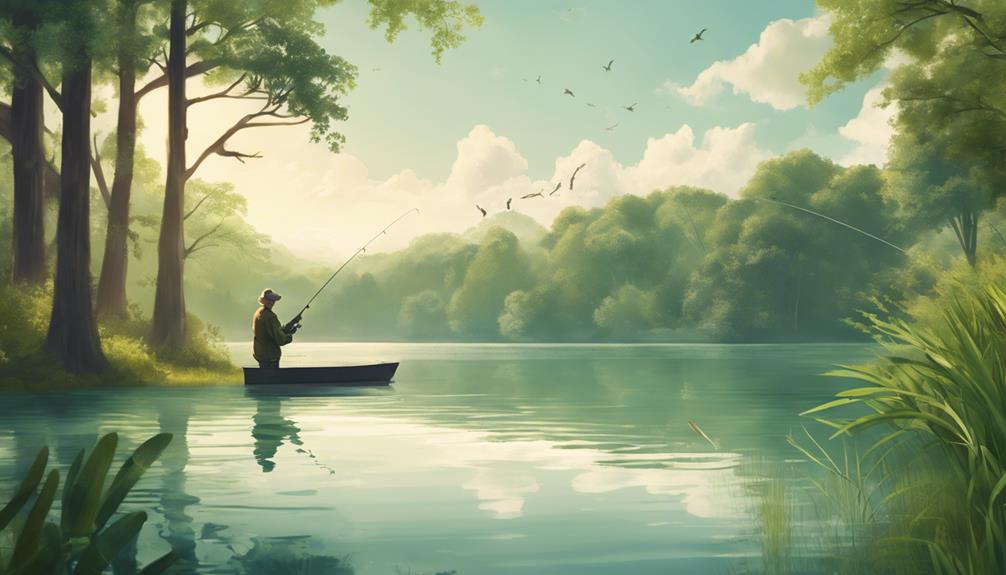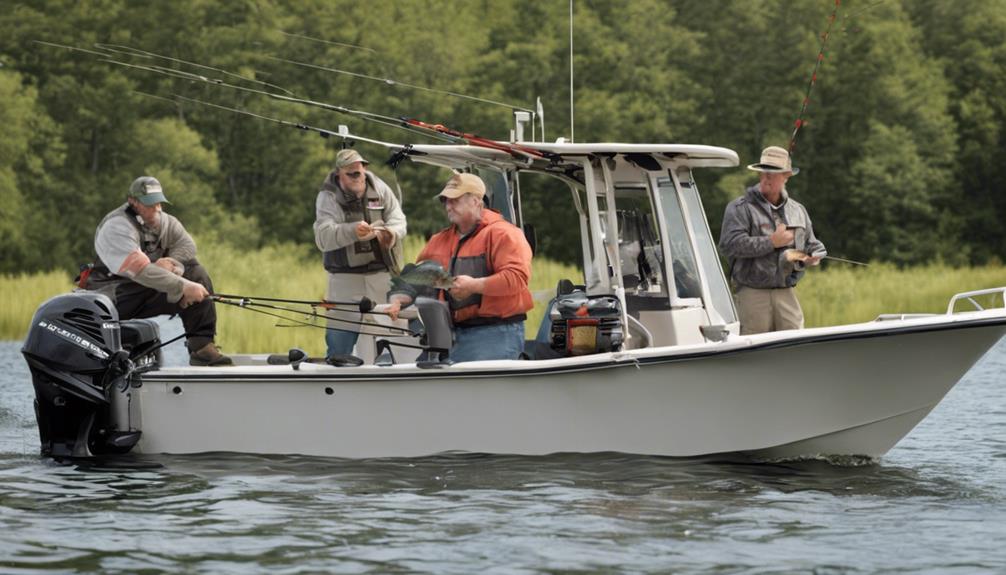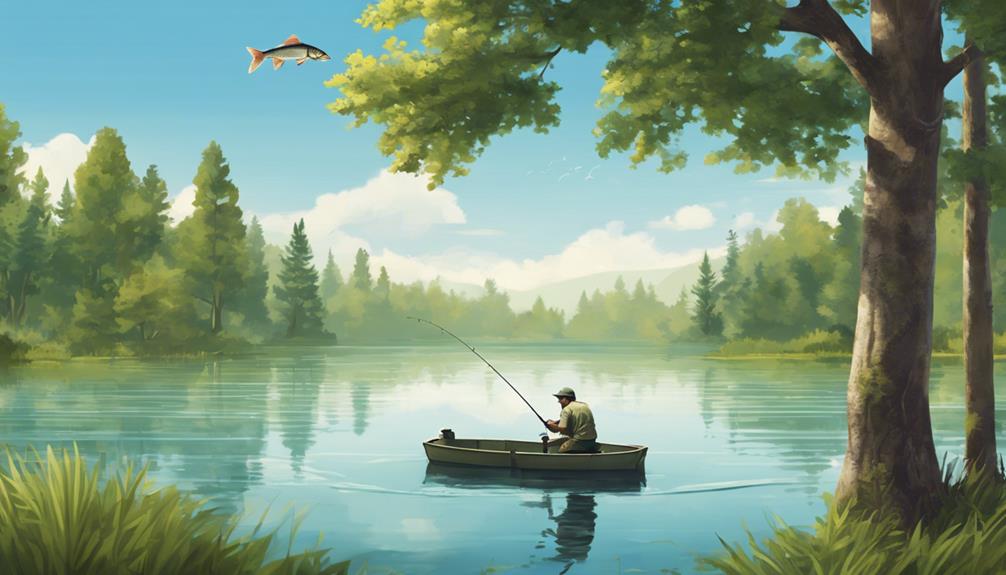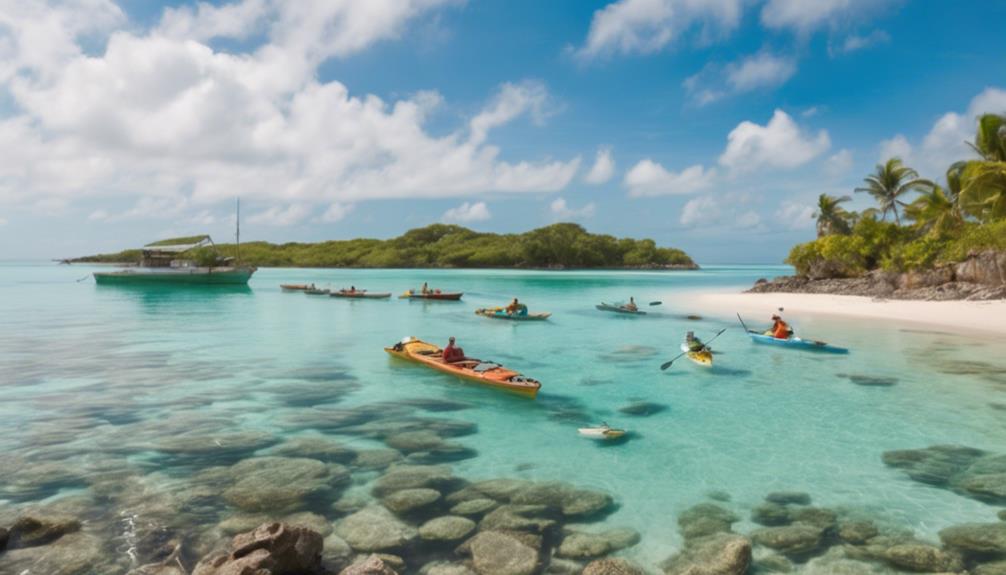Imagine a fishing license as a key to a treasure chest, unlocking valuable resources for wildlife protection and ecosystem sustainability. But why is this simple permit so essential for conservation efforts?
Let's explore the pivotal role fishing licenses play in preserving our natural world and ensuring the future of our aquatic environments.
Funding Conservation Efforts
To fund conservation efforts effectively, obtaining a fishing license is essential. By purchasing a fishing license, you directly contribute to conservation funding, which plays a crucial role in protecting wildlife and habitats. These funds are utilized for various conservation projects, such as habitat restoration, stocking programs, research initiatives, and monitoring efforts. Your contribution through a fishing license has a direct impact on the community by supporting local conservation organizations and initiatives that benefit both the environment and the people who rely on it.
The economic benefits of obtaining a fishing license extend beyond individual enjoyment. The revenue generated from fishing licenses helps sustain local economies by supporting jobs in the fishing and tourism industries. Additionally, wildlife protection is enhanced through the enforcement of regulations funded by fishing license sales. These regulations ensure sustainable fishing practices, prevent overfishing, and safeguard vulnerable species.
When you invest in a fishing license, you aren't only gaining access to recreational fishing opportunities but also actively participating in conservation efforts. Your contribution has a ripple effect, benefiting the environment, local communities, and future generations. So, next time you head out to enjoy a day of fishing, remember the significant impact your fishing license has on conservation funding and wildlife protection.
Supporting Sustainable Fisheries
Investing in sustainable fisheries ensures the long-term health of fish populations and marine ecosystems. By engaging in sustainable fishing practices, you play a crucial role in preserving the delicate balance of marine ecosystems. Sustainable fishing focuses on methods that maintain the target species' population size, minimize bycatch, and protect habitats. These practices help prevent overfishing, which can lead to the depletion of fish stocks and disrupt the entire marine food chain.
Supporting sustainable fishing means making choices that prioritize the health of marine ecosystems. When you opt for sustainably sourced seafood, you support fisheries that adhere to regulations aimed at conserving fish populations and their habitats. By doing so, you contribute to the preservation of biodiversity in our oceans and safeguard the livelihoods of fishing communities that depend on healthy fish stocks.
Choosing sustainable fishing also means considering the long-term impacts of your actions on the environment. By supporting sustainable fisheries, you help ensure that future generations can continue to enjoy the benefits of thriving marine ecosystems. Your commitment to sustainable fishing practices today paves the way for a more sustainable future for our oceans and the diverse species that call them home.
Monitoring Fish Populations
By monitoring fish populations, you actively contribute to the conservation efforts necessary for maintaining the health of marine ecosystems. Tracking population trends through data collection is essential for understanding the status of fish species and making informed decisions to ensure their sustainability.
Data collection plays a crucial role in monitoring fish populations. Through techniques such as population surveys, tagging programs, and genetic analysis, scientists gather information to assess the abundance, distribution, and health of fish species. This data allows experts to identify trends over time, determine if populations are declining or increasing, and pinpoint areas where conservation efforts are most needed.
Understanding population trends is vital for effective conservation. By monitoring fish populations, you can help identify overfished species or habitats under stress. This information enables authorities to implement measures such as catch limits, protected areas, or habitat restoration projects to conserve fish populations and their ecosystems.
Your involvement in monitoring fish populations through data collection contributes to the broader goal of sustainable fisheries management. By staying informed about population trends and supporting conservation initiatives, you play a direct role in safeguarding marine biodiversity and ensuring the long-term health of our oceans. Your efforts in data collection today can have a significant impact on the conservation of fish populations for future generations.
Restoring Habitats
Improving degraded habitats is crucial for enhancing the overall health of fish populations and marine ecosystems. Habitat restoration plays a vital role in ensuring that fish have suitable areas to breed, feed, and seek shelter. By restoring habitats such as wetlands, coral reefs, and mangroves, you directly contribute to the preservation of biodiversity and the balance of marine ecosystems.
Restoring habitats is essential for maintaining ecosystem health. When habitats are degraded or lost, fish populations suffer from a lack of suitable environments to thrive. By engaging in habitat restoration efforts, you actively participate in the recovery of fish populations and help to safeguard the delicate balance of marine ecosystems.
Habitat restoration projects involve activities such as replanting native vegetation, removing invasive species, and restoring water quality. These efforts not only benefit fish populations but also have a positive impact on other marine organisms and the overall health of the ecosystem.
Enforcing Fishing Regulations
Ensuring compliance with fishing regulations is crucial for the sustainable management of fish stocks and marine resources. The enforcement effectiveness of these regulations directly impacts the health of aquatic ecosystems and the preservation of various fish species. Regulatory compliance plays a significant role in maintaining the delicate balance of marine life and preventing overfishing.
Effective enforcement mechanisms are essential to deter illegal fishing practices and protect vulnerable species. By monitoring fishing activities and enforcing regulations, authorities can prevent harmful practices such as overharvesting, bycatch, and illegal fishing methods. Strict enforcement also helps ensure that fishing limits are respected, allowing fish populations to replenish and thrive.
Regulatory compliance relies on a combination of surveillance, penalties for violations, and community involvement. Surveillance technologies such as satellite tracking and drones enable authorities to monitor vast marine areas efficiently. Penalties for non-compliance serve as deterrents, discouraging individuals from engaging in illegal fishing activities. Additionally, educating and engaging the fishing community in conservation efforts foster a sense of responsibility and stewardship towards marine resources.
Educating Anglers on Conservation
Educating anglers about conservation practices is essential for fostering sustainable fishing habits and protecting marine ecosystems. By raising awareness among anglers about the importance of conservation, we can ensure the longevity of fish populations and the health of aquatic environments. Community involvement plays a crucial role in this educational process.
To effectively raise awareness, angler education programs can be implemented. These programs should cover topics such as catch-and-release techniques, sustainable fishing practices, and the importance of respecting fishing regulations. By educating anglers on how their actions can impact marine ecosystems, we empower them to make informed decisions while out on the water.
Community involvement is key to spreading the message of conservation among anglers. Local fishing clubs, conservation organizations, and government agencies can work together to organize workshops, seminars, and events that focus on sustainable fishing practices. These initiatives provide anglers with the knowledge and skills needed to minimize their environmental impact and contribute to the preservation of marine biodiversity.
Preserving Biodiversity
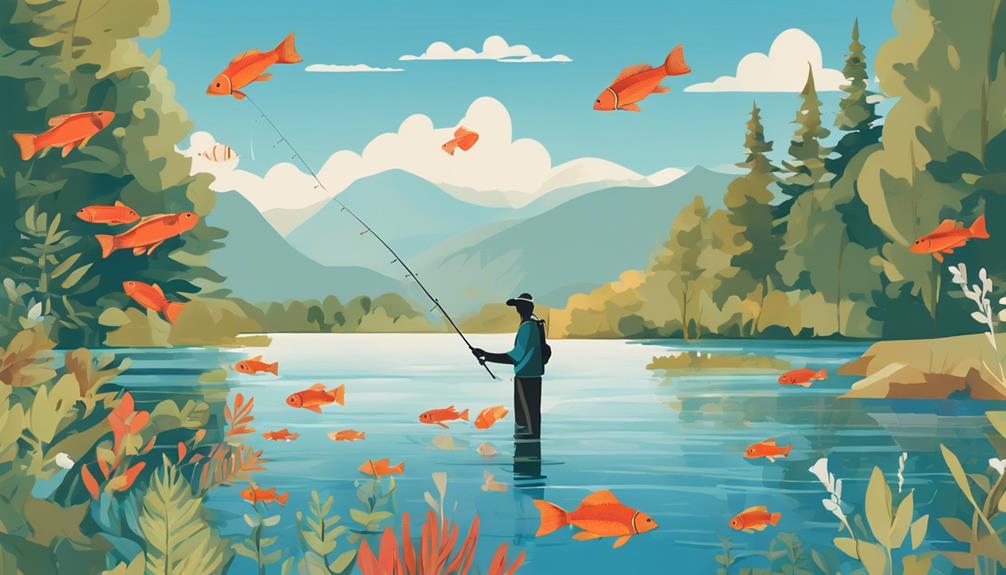
To safeguard the variety of species in marine ecosystems, it's essential to prioritize the preservation of biodiversity through sustainable fishing practices. Habitat preservation plays a critical role in maintaining ecosystem balance. By protecting the diverse habitats where marine species live, such as coral reefs, mangroves, and seagrass beds, you directly contribute to the well-being of countless organisms. These habitats serve as nurseries, breeding grounds, and shelters for a wide array of marine life.
Species protection is another key aspect of preserving biodiversity. When you adhere to fishing regulations and catch limits, you help prevent overexploitation of vulnerable species. This, in turn, supports population sustainability and genetic diversity within species. Each species plays a unique role in the intricate web of life in the oceans, and maintaining their genetic diversity is crucial for their long-term survival.
Promoting Ethical Angling Practices
Preserving biodiversity through sustainable fishing practices also involves promoting ethical angling practices to ensure the well-being of marine ecosystems. To promote ethical angling practices, consider the following:
- Catch limits: It's crucial to adhere to catch limits set by regulatory authorities to prevent overfishing and ensure the sustainability of fish populations. By respecting these limits, you contribute to maintaining a balanced ecosystem and preserving fish species for future generations.
- Catch and release: Engaging in catch and release practices can significantly reduce the impact of fishing on fish populations. By releasing undersized or excess fish back into the water, you help maintain the natural balance of marine environments and allow fish to reproduce and contribute to their species' survival.
- Responsible handling: Properly handling fish during and after the catch is essential for their survival. Avoid causing unnecessary harm or stress to the fish by using barbless hooks, wet hands when handling, and releasing them gently back into the water.
- Respect wildlife: Remember that ethical angling practices extend beyond fish. Respect all wildlife encountered while fishing, including birds, mammals, and other marine creatures. Minimize your impact on their habitats and avoid disturbing or harming them during your angling activities.
Frequently Asked Questions
Can I Fish Without a License if I Am Only Fishing for Personal Consumption and Not for Sport or Profit?
If you're fishing solely for personal consumption and not for sport or profit, you may still need a license depending on the regulations in your area. Fishing without a license can have legal implications and consequences, even if it's for personal use.
This helps ensure sustainability of fish populations and supports conservation efforts. Be sure to check local laws to avoid any issues and contribute to the protection of aquatic ecosystems.
How Are Fishing License Fees Determined and Where Does the Money Go?
Fishing license fees are determined based on factors like duration and type of fishing allowed. The money generated from these fees is crucial for conservation efforts.
Revenue allocation typically includes funding for fishery management, habitat restoration, and stocking programs. These initiatives directly impact the sustainability and preservation of fishing resources.
Are There Any Exemptions or Discounts Available for Certain Groups of People When It Comes to Purchasing a Fishing License?
When it comes to purchasing a fishing license, there are exemptions and discounts available for certain groups of people. Exemption qualifications can vary based on age, disability, or residency status.
Additionally, there are special circumstances where group discounts may apply, such as for veterans or senior citizens. Checking with your local fishing authority can provide more information on eligibility for these discounts and exemptions.
Can I Transfer My Fishing License to Someone Else if I Am Unable to Use It?
If you can't use your fishing license, you usually can't transfer it to someone else. Regulations often don't allow license sharing or gifting to maintain compliance with conservation laws.
Always check with your local fishing authority for specific rules regarding license transfers. It's crucial to follow these guidelines to protect fish populations and ensure sustainable fishing practices for future generations.
What Happens if I Am Caught Fishing Without a License?
If you're caught fishing without a license, legal consequences can include hefty fines or even citations. These penalties are enforced to protect fish populations and their habitats.
Conclusion
So, next time you head out for a fishing trip, make sure you have your fishing license in hand.
By obtaining a fishing license, you aren't only following the law but also contributing to vital conservation efforts.
Your support helps fund conservation programs, protect fish populations, restore habitats, and promote ethical angling practices.
Remember, every little bit counts when it comes to preserving our natural resources for future generations.
